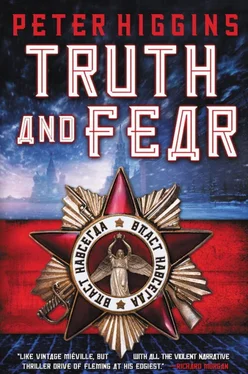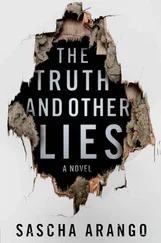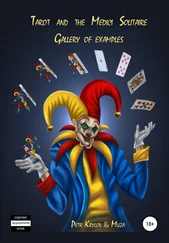The man who was with the woman was spilling bright shining communication, all unawares. Florian could have found him a mile away in a dark forest at night in a thunderstorm, and the man did not even know it. Though he did have some vague sense of Florian’s presence: Florian watched him hesitate and look around. But the man did not look up. Nor did the police look up. They never looked up. Not until they learned. If they ever did.
Experimentally, Florian shifted and adjusted the bone structure of his face. Slid musculature into new places under warm sleeves of flesh. His hair moved like leaves under water. He tested thickness and shade, melatonin and refraction. It was enough. He was confident. When the woman and the man and the four policemen had passed beneath him, Florian leaped down from the second-floor ledge, landing lightly on all fours on rain-skinned cobbles, rose up and followed.
Thousands of miles east of Mirgorod, deep in the endless forest, the immense, mountainous body of Archangel rises against the skyline like a storm cloud approaching. His consciousness bleeds into the surrounding country, not life but anti-life, oozing out through the forest like lichen across rock. Like piss in snow. In the lower skirts of his body, dead-alive giants of ice and stone with eroded faces lumber waist-high through crumbling stone trees.
A wonderful thing is happening to Archangel. He is beginning to recover.
He has wormed and rooted tendrils of himself down through the planetary crust and deep into the hot seething places. He has spread vapours of himself thinly on the upper layers of the atmosphere, sifting solar radiation. And now, at last, slowly, slowly, the clouds of forgetfulness grow thin and dissipate in the growing heat of his renewed interior sun.
Far down inside the painful solid rock of himself, Archangel feels gobbets of mass spark into energy. Tiny bright cold shards of pure elation spark and shatter. Crushed clods of light stretch and breathe. Fragments of dead processes, imploded and squeezed to appalling density by his flight and fall, are unpacking themselves and restarting. Raw spontaneous networks unfurl and new possibilities trickle across them, glittering into self-awareness. Archangel, ancient as all the stars, old and hurt, wrapped in scraps of memory and stunted relics of ambition, is growing young again.
He makes an inventory of his inward terrain. Scraps of brightness in a dark country. He hadn’t realised how much of himself he had lost and forgotten. How far gone dead he’d been. Even now the greater part of him remains useless. Eclipsed. Obscure. Inert. And much that was lost will never return, not while he remains trapped here on this small dark planet.
He cannot escape. He hasn’t the strength for that, not yet. But he can, at last–at last!–begin to move.
With a roar of agony and joy, thunderous and tree-shattering, Archangel grinds and slides forward, forcing extrusions and pseudopodia of himself out across the landscape. He is a rock amoeba, a single-cell life-form mountain-high. It hurts. With painful slowness at first, millimetre by screaming millimetre, a metre by day, a metre by night, onward he goes. The ground for miles around him trembles. The flanks of his momentous body shed fresh avalanches. He is anti-life rock mountain slowly moving, leaving in his wake a slug-trail of seething, crippled waste. As he goes he screams out in his agony and joy and desperate purpose. It is a fear voice. A true power voice. The voice of history.
And in Mirgorod Josef Kantor hears him.
Lom was in a cell in the local gendarme station down a side street just off Marinsky Square. It was barely a cell at all, more of a windowless cupboard: brick walls painted a pale sickly green, worn linoleum lifting from a concrete floor; it was hardly big enough for the table and two chairs. The door was plain, unpainted wood, panelled, not solid, with a standard domestic lock. There was a single caged lamp in the ceiling. They still hadn’t searched him; they’d locked him in without a word; they weren’t interested in him. Maroussia had been taken to another room. But somebody would come in the end. Somebody always did.
He climbed on the table, unhooked the lamp cage and smashed the bulb, plunging the room into darkness, then climbed back down, felt his way to the door and took up a position beside it, back against the wall. The darkness inside the room would give him half a second. Whoever came would hesitate. Wonder if they’d come to the wrong cell. Then caution and alarm would kick in, but not immediately. He would have half a second at least, and that would be all he needed.
He waited, but nobody came. The narrow line of brightness seeping under the door was the only light. Somewhere in the distance a door slammed shut.
He’d noticed on the way in that the station was almost deserted. Everyone who could be spared was out on the streets. He thought about that. The whole of the city centre was locked down and under surveillance. It couldn’t possibly be all for him and Maroussia. Something else was happening. Something bigger. He listened for footsteps coming down the corridor but none came. A muffled telephone rang three times and broke off. That and his breathing and the quickened beating of his heart were the only sounds he could hear. He focused all his attention on the corridor on the other side of the door. Ready for the sound of the key in the lock. The handle beginning to move.
The air in the room was warm and thick and oppressively close. All interrogation rooms smelled the same: the acrid tang of disinfectant failing to mask the faint stale sweetness of vomit and urine and sweat. Lom had been in cells like this one many times before. For years, when he was an investigator of police in Podchornok, such rooms had been comfortable spaces for him. They were his working environment, a place to do what he did well: uncovering truth, extracting truth, the skilled and delicate practice of peeling back surfaces, evasions, pretences, assertions, lies.
In Podchornok Lom had considered himself a subtle, accomplished interrogator. He’d admired himself for his delicacy of touch. He didn’t use the crude and brutal techniques that many of his colleagues used. He’d never done that. Well, hardly ever, and only when urgently necessary. He used to think that his tools were persistence, empathy, imagination, patience and preparation. He had a nose for the hidden core of fact and an instinct for the detours and false constructions people used to obscure it. Everybody left traces. Lom used to think he was clever. Perceptive. He’d never realised, it had simply never dawned on him, not in Podchornok, that the tool he used–the only effective tool in his box–was fear. When prisoners looked up as he stepped into the interrogation room, they never saw Lom the sympathetic, imaginative man, the disinterested investigator nosing for facts. All they saw–all there was to see, because that’s all he was–was an avatar of fear. A black serge uniform, belt and boots and antler buttons polished, a sliver of angel flesh in his forehead; the cropped fair hair and frank blue eyes of a man who could, if he chose, at his own inclination, break their bodies and break their families, break their careers and break their lives. They’d sweated and felt sick while they waited for him to come, and when he did come they all wanted to piss themselves and some of them did. And he had done that to them, not by what he said or what he did–not often–but simply by being what he was: not a man with a job to do, but an expression of the Vlast in human form.
You couldn’t be a man who happened to be a policeman. Not in the Vlast. You could cling, in the stories you told yourself about yourself, to the evasions, the illusions, the fictions of somebody drawing interior lines, keeping it clean: that could be how you saw yourself, but it wasn’t what you were . What a prisoner saw when you walked into the interrogation cell, that and only that, that was what you were . All those dead and wasted years in Podchornok that’s what he had been, Vissarion Yppolitovich Lom the unselfconscious torturer, excavating truth with fear. Vissarion Lom, one of Chazia’s men.
Читать дальше


![Кэмерон Доки - Правда и ее последствия[Truth and Consequences]](/books/79610/kemeron-doki-pravda-i-ee-posledstviya-truth-and-con-thumb.webp)









